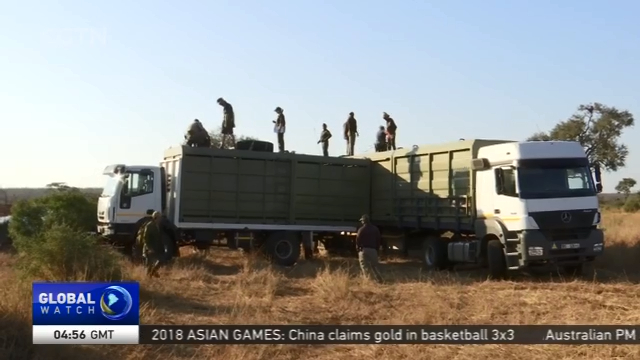
19:35, 27-Aug-2018
Protecting Wildlife: South Africa moves wildebeest to Mozambique
Updated
19:10, 30-Aug-2018
03:37

In South Africa, a difficult maneuver to reintroduce a species, the country's National Parks system has moved a herd of wildebeest to the Zinave National Park in Mozambique. This herd of wildebeest is among 150 that will be captured and moved to that park. CGTN's Yolisa Njamela has more.
It's a spectacular scene as the huge herd of the wildebeest species is gathered to be mass captured. This translocation is part of a partnership between the Mozambican government and South African National Parks. It's meant to reintroduce the species to the wild after its extinction in that country.
IKE PHAAHLA SPOKESPERSON, SOUTH AFRICAN NATIONAL PARKS "South African National Parks has done very well in terms of conservation and we have surplus antelope species that we were able to donate to Zinave so that we can rewild that area which was badly affected by the civil war in that country. So we took wildebeest, took some zebra and also took some impala."
The translocation started early this year. The aim is to translocate 150 blue wildebeest, 200 zebras and 520 Impala. It's a multifaceted operation that requires high care for the species. It's also potentially dangerous to those who are tasked with the capture.
GRANT KNIGHT CHIEF PILOT, SANPARKS "Essentially it is one of the high risk profiles for helicopter flying worldwide, game capture in sight and that essentially comes down to the fact that this type of flying is very low level, very slow, it's hovering a lot and that in itself doesn't lend to emergency procedures."
To ensure smooth capture - the wildebeests are directed into a metal container with an open top before they are guided up a ramp and into a large truck where they are tranquillized.
So far the success rate of the translocation has impressive.
IKE PHAAHLA SPOKESPERSON, SOUTH AFRICAN NATIONAL PARKS "We are proud to report that there were no casualties or injuries from the side of the game that was transported to Zenavi. We have experts that were accompanying the team. The experts also made sure that when they loaded them, the animals were tranquilized so that when they get there, they can release them into an area that will help them to acclimatize and they only get released once they have acclimatized to their new surroundings."
The observation of the translocation process is part of a media trip organized by the South African National Parks to the Kruger National Park to share information on anti-poaching and other conservation efforts in the park.
YOLISA NJAMELA KRUGER NATIONAL PARK, SOUTH AFRICA "The project is expected to take a number of years to be completed. SANParks is hoping that the species will adapt quickly to their new environment which would mean better survival chances."
IKE PHAAHLA SPOKESPERSON, SOUTH AFRICAN NATIONAL PARKS "The project is a five-year project. It started in August and will continue until we can see that the numbers are enough to attract a tourist into that area."
Phaahla says the South African National Parks will continue to assist neighboring countries by reintroducing some species that have been lost due to poaching.
Yolisa Njamela, CGTN, Kruger National Park, South Africa.

SITEMAP
Copyright © 2018 CGTN. Beijing ICP prepared NO.16065310-3
Copyright © 2018 CGTN. Beijing ICP prepared NO.16065310-3